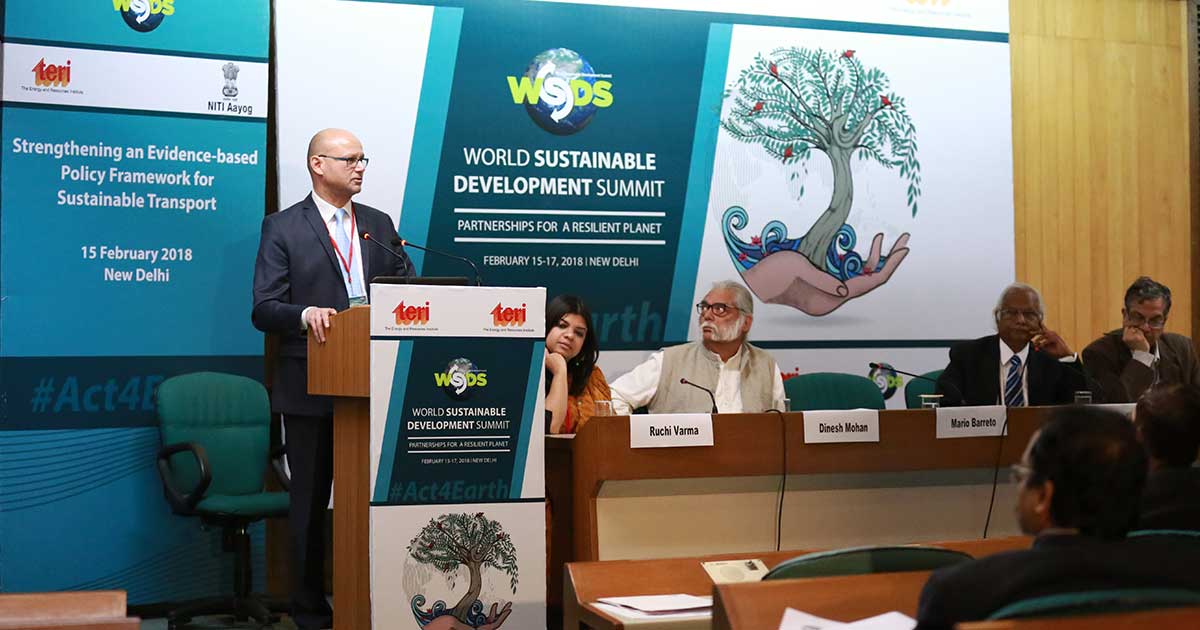
India's transport system needs effective data management system
 Mr Mario Barreto, International Transport Forum/OECD, Paris, said that international cooperation would be a key factor in upholding data quality.
Mr Mario Barreto, International Transport Forum/OECD, Paris, said that international cooperation would be a key factor in upholding data quality.
The Indian transportation sector is an important pillar of the economy, contributing close to 7% of the GDP. Despite this, the transport policy-planning is not an easy task in India. While the oil and gas sector meets the alternative fuel demands of the domestic, commercial and industrial sectors, the possibility and potential of alternative fuels for the transport sector has not really been realized.
Reliable data: Key to evidence-based policy framework
In the context of the issues that threaten sustainable growth, such as climate change, improvement in resource-efficiency in the transport sector would be crucial. This can be brought about by mining reliable data. Without evidence of data, effective policy formulation becomes difficult and jeopardizes the ability to evaluate options.
"Data is the lifeblood of the decision-making process. We need to use efficient systems and collaboratively empower each other through data collection and data sharing, so no one is left behind," said Ms Ruchi Varma, Programme Manager-Urban Development, Open Cities Institute.
"The Indian Railways is a pioneer in data management systems after the early computerization of data management in the 1980s. We are working to deploy Big data analytics and AI for effective decision support mechanism," said Mohd Jamshed, Member, Traffic Railway Board and Secretary to the Government of India.
Moving towards integration and inclusion
In order to create an integrated policy framework for transportation and also for ground use interaction, it is critical to have access to raw data that can be extrapolated or analysed to arrive at an inclusive model of growth for the transportation sector. Since railways and roadways are not enough for sustainable transportation, an integrated model of transportation will pave the way for future growth.
Economic Growth fuelled by reliable data
It is interesting to note that the cost of international produce available in Indian markets is marginally high than the produce grown in India. This is not an anomaly but is a direct result of lower costs of transportation over long distances.
Japan and Korea can produce steel at cheaper costs due to the shore-based industry which benefits from negligible domestic transport cost of iron ore imported from other countries.
Broken Indian transport machinery
Transportation costs can drive economies and household behaviour. Despite this, in India the costs of goods are high due to higher domestic transportation costs. As compared to developed countries, India has huge unutilized free transportation stock which sits idle or is stalled at the check posts.
The efficient transportation in the US allows a truck to cover over 4 lakh km per annum, whereas in India the distance covered remains between 40,000 and 60,000 km per annum, incurring huge loss to the economy and impacting increased costs of goods.
Standardization to international norms would be key in growing the transport sector in a stable manner. "What we need today to improve the transport policy by hiring trained data management professionals with permanent jobs in the government. Experience would be important in producing reliable data that can be used to forecast and make decisions," said Prof Dinesh Mohan, Emeritus Fellow, IIT-Delhi.
What India needs today
According to the panelists, an efficient data management system is required to streamline the industry through policy interventions. Reliable and authentic data, which is open to public scrutiny, is crucial in increasing sector efficiency. In fact, the government needs to take strong measures to cultivate a team of professional data management experts with permanent jobs, who can gain experience in collecting, segregating, analysing, managing this type of transport data. The system should employ a data-driven strategy to bring about a massive change.